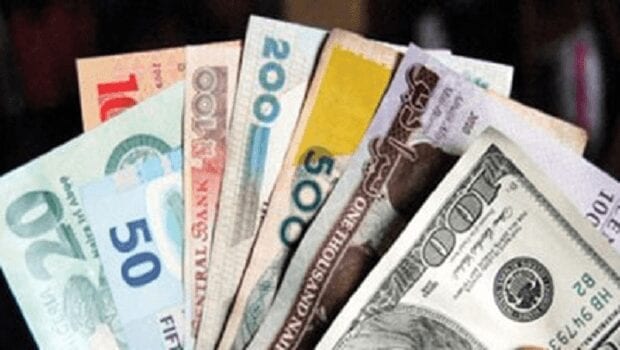Global depositary receipts (GDR) of Guaranty Trust Bank (GTB) and Zenith Bank that are listed in London are offering a clue on the true naira dollar market value, as well as providing some arbitrage opportunity for savvy investors.
Nigeria’s central bank sells dollars at its weekly auctions at the current official rate of N199, and probably satisfies only a quarter to one-fifth of demand.
On the largely illiquid parallel market, the dollar trades for near N350, according to a BusinessDay survey of street dealers, who handle only cash.
The effective dollar conversion rate for the GDRs was N223 as at the end of Tuesday trading in Lagos, according to BusinessDay calculations.
For Zenith Bank, the conversion rate was N277 per dollar.
“GTB GDR is better priced because they are more liquid as reflected in the frequency of trades,” said Oluwatosin Ojo, head of Research at investment firm Cardinal Stone Partners, in response to BusinessDay questions.
“If I would estimate what the fair exchange rate would be, GTB GDR’s equivalent exchange rate seems more accurate. Also, GTB GDR’s equivalent exchange rate is close to where 3 month non-deliverable forwards (NDFs) are trading at now.”
Both Nigerian Bank GDRs are denominated in dollars and trade on the London Stock Exchange (LSE).
Each GDR represents 50 ordinary shares of Nigerian Stock Exchange (NSE) listed shares for both banks that trade in the local currency- the naira.
The GDRs are within levels for naira non-deliverable forwards.
Three-month naira non-deliverable forwards fell by 4.25 percent to N235 yesterday, down from record levels reached a day earlier.
Nigerian Vice President Yemi Osinbajo announced a review of the currency regime on May 11 that “may feature” a devaluation, which combined with the removal of caps on fuel prices that has seen the naira come under pressure in the parallel market.
“The risk is that with more demand for FX on this market and no big increase in FX supply (the situation would be different in the event of an official devaluation) we will see even more FX weakness, feeding through into higher prices, with monetary policy poorly equipped to react. As much of the FX weakness will be taking place outside of the banking system, “ Razia Khan, chief economist, Africa, at Standard Chartered bank, told BusinessDay.
The Nigerian Central Bank has imposed capital controls and set an artificially high level on the currency, making it unattractive for investors to buy naira assets.
The GDR trade suggests however, that a little devaluation could push the naira nearer equilibrium as opposed to the much higher levels suggested by the parallel markets whose illiquidity makes analysis of the market unreliable.
The dollar was trading at N350 at the parallel market on Tuesday up from N320 before announcement of deregulation of petrol prices.
The parallel market currently trades on $2bn-$4bn maximum in a year, according to Bismarck Rewane, CEO of consulting firm Financial Derivatives Company. (FDC).
“If Nigeria adopts a more flexible exchange rate, dollar demand for oil imports can be accommodated in the official market,” Rewane said.
For investors looking for arbitrage opportunities from the GDR trade, such an opportunity exist, although transactional constraints limit the possibilities of such a trade.
“There is clearly an arbitrage opportunity. However, in reality, transactional constraints limit the possible gains. In theory, if an investor currently has GTB GDRs, he/she can profit from the arbitrage by selling the GTB GDRS, buy an equivalent amount of Zenith GDR, convert the Zenith GDR to shares on the NSE and sell in naira. The investor will make more this way, than converting the GTB GDR directly,” said Ojo of Cardinal Stone Partners.
For investors not owning the GDRs in the first place, the trade becomes more difficult.
“The differential in the exchange rates implied by the prices of the GDRs of the two banks (i.e. N232 and N290) is a clear indication of market distortion in the pricing of the two instruments, and hence, arbitrage opportunities abound. However, we do not believe the perceived arbitrage opportunity can be exploited because the purchase of the US Dollar for the purpose of share purchase is exempted from access to foreign exchange at the official market,”Olutola Oni, head of research at investment firm, WSTC financial services Ltd, said in response to questions.
BusinessDay































